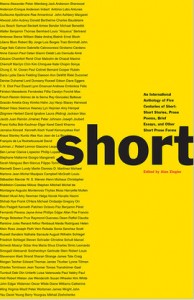Short Edited by Alan Ziegler
 Short: An International Anthology of Five Centuries of Short-Short Stories, Prose Poems, Brief Essays, and Other Short Prose Forms
Short: An International Anthology of Five Centuries of Short-Short Stories, Prose Poems, Brief Essays, and Other Short Prose Forms
Edited by Alan Ziegler
Persea Books
354 pages / $16.95 Buy from Amazon
I realize now that the only thing you can do with any anthology is take issue with it: who was included, who wasn’t, what order they’re in, why there’s more x than y. But before I step into the trenches, I want to note right off the bat that Short is an important and impressive document. It comes at a time when the short form, especially in its incarnation as “hybrid genre,” is gaining traction both in indie and (to a lesser extent) mainstream circles. I need not list presses like Tarpaulin Sky and Rose Metal Press; authors as different as Lydia Davis and Amelia Gray; lit mags like NANO Fiction and Gigantic. And that’s just a very small, very indie cross-section. Hell, Sentence already lived a full life and closed its doors.
Point is, I shouldn’t have to convince you that understanding the evolution of very short prose is an important project for the contemporary literary landscape. And it seems that Alan Ziegler, editor of Short, is the right man for the job. On his resume, besides his own books of “tales” and “takes,” is having taught Short Prose Forms at Columbia since 1989. That’s a long time.
Of course, here’s where the bones-to-pick start coming in. Ziegler’s definition of “short” is a little different from what mine might be: 1,250 words is his limit, which allows writing up to four pages to make it into Short. I can’t help but think that some of the pieces at the upper limit of this mark—Donald Barthelme’s happily tooting “The King of Jazz,” for example—cease to be short a few hundred words before their end.
If I was looking to criticize, I might take issue with the treatment of the pieces too: they’re printed one after another, with almost no whitespace. I understand that this is a logistical measure, and the anthology couldn’t house nearly the number of pieces it does if each piece were given its own page. Still, the purist in me argues that fewer, better-presented pieces would be more effectual than more works, smashed into the same space. Such a large part of reading very short prose is having the visual space to consider it after its textual work is done; reading Short is a little like reading Shakespeare in one of those two-column tiny-print Collected Works volumes.
Then again, such are the casualties of reading an anthology cover-to-cover. Those shorts which originally appeared in a full book of such pieces appear bizarre and sort of hamstrung out of their context. Amelia Gray’s, for example, the last one in the anthology, doesn’t carry nearly the pleasure as when you read it in the context of AM/PM as a whole. “Remain Healthy All Day,” it begins, before its laundry list of odd directives. If we didn’t know better, we might think she was being glib. But in the original, wonderful edition from featherproof, we’ve already begun the everyday tragedies of our friends Terrence and Charles and see, through their eyes, the direness of being asked to “Use a warm towel to dry the cat.”
This strange, decontextualized nature of the anthology might partially be remedied, I thought, by changing the order of the pieces. Ziegler orders them according to the birthdate of their authors; we start at Girolamo Cardano’s “Those Things in Which I Take Pleasure” (1501) and end with Gray. The shorts take on an often similar thrust to those with which they are surrounded, then. The beginning is full of fairly staid ruminations, which pick up speed as we pass through Poe and Baudelaire and reach a cruising altitude more amenable to the contemporary palate with writers born after 1925, to whom the second half of the book is devoted. I appreciated the alternative jaunt through literary history but perhaps, I wondered, the crowdedness of this volume might be better suited to a random sequence—by first initial of last name, for example. Then the close juxtaposition of pieces, instead of being tiresome and chronological, might be fortuitous and on any given page point to a sort of conversation across the ages. What an artistic concept! All of them in a room together!
February 14th, 2014 / 10:00 am
